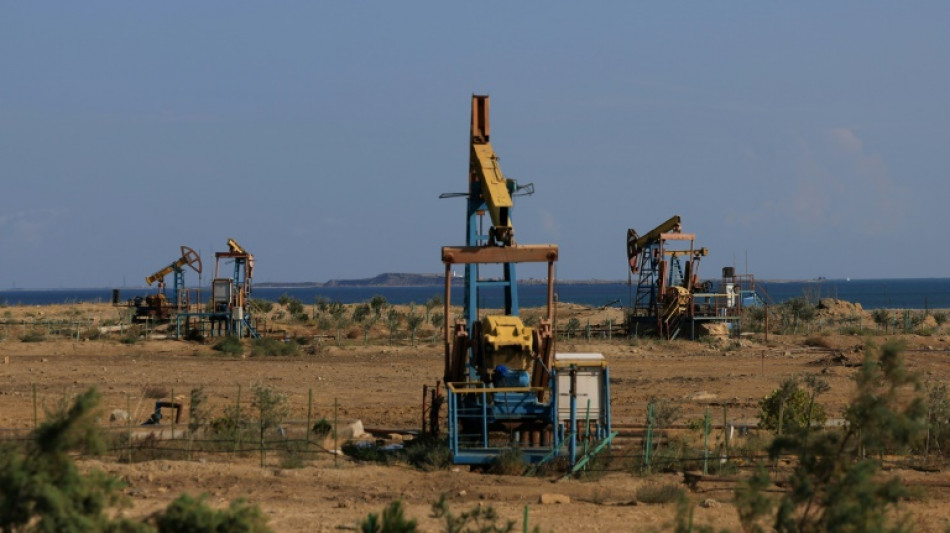

'Vanity project': a climate summit in oil-rich Azerbaijan
The decision to hold a climate summit in oil-and-gas-producer Azerbaijan, which will be hosting the COP29 UN Climate Change Conference this year, has puzzled many environmental groups.
But the tightly controlled energy-rich Caspian nation is seeking to change its reputation as a polluting authoritarian state.
Baku has in recent years organised numerous high-profile international events, which experts say are aimed at bringing prestige to the country ruled with an iron fist by President Ilham Aliyev.
Baku has hosted matches in the Euro 2020 football championship, as well as the Formula 1 Grand Prix, plus the 2021 Eurovision song contest -- all of which brought international attention to the country, whose reputation is tarnished by massive rights violations.
"These are vanity projects for Azerbaijani leadership," Giorgi Gogia, Human Rights Watch associate director for the Caucasus, told AFP.
"Azerbaijan really cares for its international image and prestige, and is really willing to host mega events to whitewash its abysmal rights record," he added.
The latest international event -- the COP29 climate conference which will kick off in Baku in November -- will be held just over a year after its lightning Nagorno-Karabakh offensive.
In September 2023, Baku's troops recaptured the enclave from Armenian separatists who had controlled it for decades.
The region's entire ethnic Armenian population -- more than 100,000 people -- fled in the aftermath.
And while Azerbaijan gears up to host COP29, it orchestrated yet another crackdown on independent media, arresting several critical journalists who have exposed high-level graft.
- 'Centre of universe' -
Ilham Aliyev has been in power since 2003, when he succeeded his father Heydar, and is poised for an easy re-election for his fifth consecutive term on Wednesday.
The snap polls have been boycotted by the main opposition parties.
By hosting prestigious events like COP29, Baku also seeks to assert itself as a "key state in the region" where traditional powers Russia, Turkey and Iran compete for domination, said Azerbaijani analyst Elhan Shaynoglu.
In December, Aliyev said that Azerbaijan's hosting of the COP29 is proof of the "huge confidence and deep respect" of the international community towards the country.
"Baku will be the centre of the universe for two weeks," he said.
Since winning its COP29 bid, the ex-Soviet republic has already got a taste of heightened international attention -- and not always the kind it wants.
The hydrocarbon industry dominates the Azerbaijani economy with hundreds of thousands of barrels of oil produced a day and billions of cubic metres of natural gas exported annually.
Baku now aims to double gas exports to Europe, which is trying to reduce its energy dependence on Russia since the Ukraine invasion, by 2027.
Azerbaijan remains "extremely dependent on oil and gas production," accounting for 92 percent of its export revenues, according to a 2023 report by the US State Department.
It will be the second year in a row that the COP29 will be hosted by an oil giant, with the 2023 conference held in the United Arab Emirates.
Adding to the controversy, the presidency of the conference has been entrusted to Mukhtar Babayev, a former employee of Azerbaijan's state oil company, SOCAR.
"There is a major conflict of interest, for the second consecutive year," said Romain Ioualalen of the Oil Change International NGO.
- 'Risky gamble' -
Ioualalen said Azerbaijan hosting the conference was a "risky gamble" for the Caspian country, which might backfire as it will be "closely watched" on its climate policy this year.
"Azerbaijan has expansion plans, especially in gas production, which are not at all compatible with the Paris Agreement, which it must implement as the president of COP, setting specific targets for limiting climate change," he said.
Beyond environmental concerns, the Oil Change International calls for human rights respect be imposed on countries hosting a COP.
"Such an important conversation cannot take place if civil society does not have the assurance of expressing its opinions," said Ioualalen.
Last summer, rare protests in a remote village in western Azerbaijan against the pollution from a British mining company ended with arrests, according to local media.
Gogia of Human Rights Watch hopes that the international community will make use of the event to exert pressure on Azerbaijan, and aim to secure the release of political prisoners.
"What kind of climate conference will be legitimate without independent voices?"
(R.Lavigne--LPdF)



